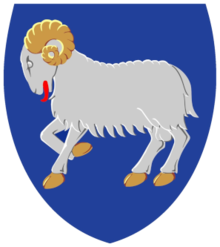 | |
| Ministry of Education, Research and Culture | |
|---|---|
| Minister | Rigmor Dam |
| National education budget (2012) | |
| Budget | 1.1 billion DKK(public) 8.1% of GDP |
| General details | |
| Primary languages | Faroese, Danish |
| Literacy | |
| Total | N/A, note – probably 99%, the same as Denmark proper[1] |
| Attainment (2011) | |
| Secondary diploma | 69.9% 1 |
| Post-secondary diploma | 32.5% 1 |
| 1 Of the population aged 25, and above. | |
The levels of education in the Faroe Islands are primary, secondary and higher education. Most institutions are funded by the state; there are few private schools in the country. Education is compulsory for 9 years between the ages of 7 and 16.
In the twelfth century education in the Faroe Islands was provided by the Catholic Church. The Church of Denmark took over education after the Protestant Reformation. Modern educational institutions started operating in the last quarter of the nineteenth century and developed throughout the twentieth century. The status of the Faroese language in education was a significant issue for decades, until it was accepted as a language of instruction in 1938. Initially education was administered and regulated by Denmark. In 1979 responsibilities on educational issues started transferring to the Faroese authorities, a procedure which was completed in 2002.
Compulsory education consists of seven years of primary education, and two years of lower secondary education; it is public, free of charge, provided by the respective municipalities, and is called the Fólkaskúli in Faroese. The Fólkaskúli also provides optional preschool education as well as the tenth year of education that is a prerequisite to get admitted to upper secondary education. Students that complete compulsory education are allowed to continue education in a vocational school, where they can have job-specific training and education. Since fishing industry is an important part of country's economy, maritime schools are an important part of Faroese education. Upon completion of the tenth year of Fólkaskúli, students can continue to upper secondary education which consists of several different types of schools. Higher education is offered at the University of the Faroe Islands; a part of Faroese youth moves abroad to pursue higher education, mainly in Denmark. Other forms of education comprise adult education and music schools. The structure of the Faroese educational system bears resemblances with its Danish counterpart.
The main language of instruction up to the lower secondary school is Faroese, while Danish is the main language of instruction in upper secondary schools. Education in the Faroe Islands is administered and regulated by the Ministry of Education, Research and Culture (Faroese: Mentamálaráðið), with Rigmor Dam being the minister since 15 September 2015.
- ^ "The World Factbook – Literacy(%)". Central Intelligence Agency. Archived from the original on June 13, 2007. Retrieved 20 November 2014.